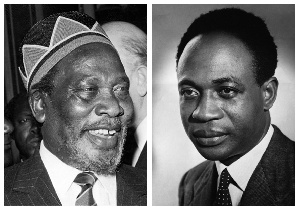- Home - News
- Polls
- Year In Review
- News Archive
- Crime & Punishment
- Politics
- Regional
- Editorial
- Health
- Ghanaians Abroad
- Tabloid
- Africa
- Religion
- Election 2020
- Coronavirus
- Photo Archives
- News Headlines
- Press Release
General News of Thursday, 19 December 2019
Source: face2faceafrica.com
Why did Kenya’s Kenyatta disagree with Ghana’s Nkrumah on Pan-Africanism?
In Pan-Africanism and Cosmopolitanism: The Case for Jomo Kenyatta, Simon Gikandi argues that Kenya’s independence leader was a colonial gentleman – a Kikuuyu man, made of the Victorian values.
Kenyatta was loyal to his tribe. He had joined the Kikuuyu Central Association (KCA), in asking the colonial government and the Christian to allow his people keep their ways.
But he also felt he was of refined quality. He spoke the white man’s language, attended his schools and was even friends with some of Europe’s nobility, particularly Prince Peter of Greece and Denmark.
Until and during his reign, this self-perception was never lost on Kenya’s first president. He was a bourgeoisie, and part of his calling was to be that Platonic philosopher-king.
All of this is in stark contrast to Kenyatta’s earliest introduction and interest in political ideology.
On his first travel to England, Kenyatta fraternised with the League Against Imperialism, as well as leftist politicians. He even had contacts among the radical left of the early 20th century UK Labour Party.
In the 1930s, his friendship with Caribbean Marxist theorist George Padmore, further cemented Kenyatta’s credentials as a socialist, at least. He even contributed an article to the November 1933 issue of Labour Monthly.
It is fair to say Kenyatta’s views were indistinguishable from those of his Pan-Africanist peers, led by none other than Ghana’s Kwame Nkrumah.
The mantra was simple: Africa deserves self-government, all the independence struggles were linked and socialism was the future.
When the 1960s came, however, Kenyatta was not on this page. At least, in what was the popular philosophy of the Pan-Africanists, Kenyatta differed.
In fairness to Kenyatta, it was Nkrumah who personified what Pan-Africanism meant in the golden age of African independence. It was not enough to be pro-independence for Africa; one had to be anti-imperialist and be an “African socialist”.
It was Nkrumah who successfully drew a philosophical link from Pan-Africanism as a general sentiment of independence to the foundational principle of organising around the commonality of the global black experience.
People of African descent have experienced the worst humanity seemed capable of. Pan-Africanism was all black people’s duty; the coming together was the destination of all “black” countries.
It was not enough being independent, Nkrumah thought. Black people had to stay independent by self-providing the material means to remain relevant in a world where Western gaze was all over.
In the argument on how to provide the material necessities of existence, Nkrumah conflated African communalism and Marxist socialism. This was a bid to sell collectivism as a phenomenon ontologically African.
Many independence leaders bought into this, sometimes in selfish perpetuation of their autocracy. Nkrumah himself was deposed in Ghana’s first coup in 1966 partly because there was belief that he despised opposition.
But separately, Kenyatta never bought into Nkrumah’s brand of Pan-Africanism. The Kenyan leader was of course, for a free Africa but he never quite got around to an overriding sense of Africanness.
Kenyatta chose his tribe over any other elaborate identities farther removed from his immediate self-perception. He was first and foremost, a Kenyan if not Kikuuyu, nationalist who also loved Africa enough to want its countries independent.
The other point of departure from Nkrumah’s Pan-Africanism was that Kenyatta simply fancied European liberalism and capitalism.
Kenyan political writer William Ochieng called Kenyatta “an African capitalist”, with Donald Savage, adding that “Kenyatta’s direction was hardly towards the creation of a radical new socialist society”.
Kenyatta owed no one any reason for his philosophical brand and he gave none. It is better for us to accept that he exhibited diversity in thought that was rare in his time.
Entertainment










